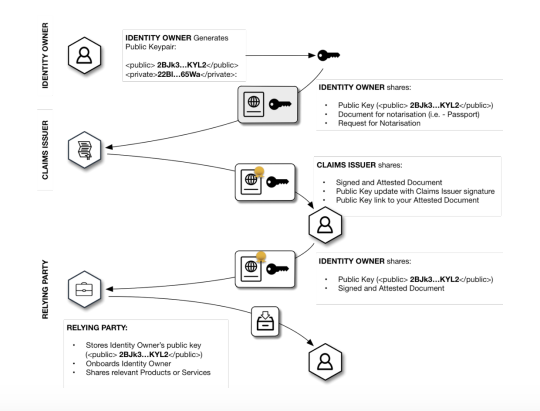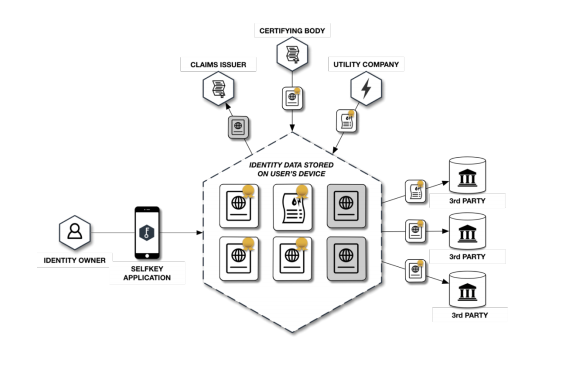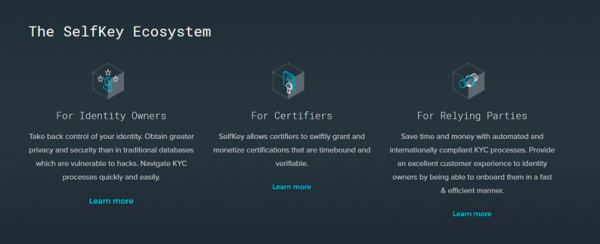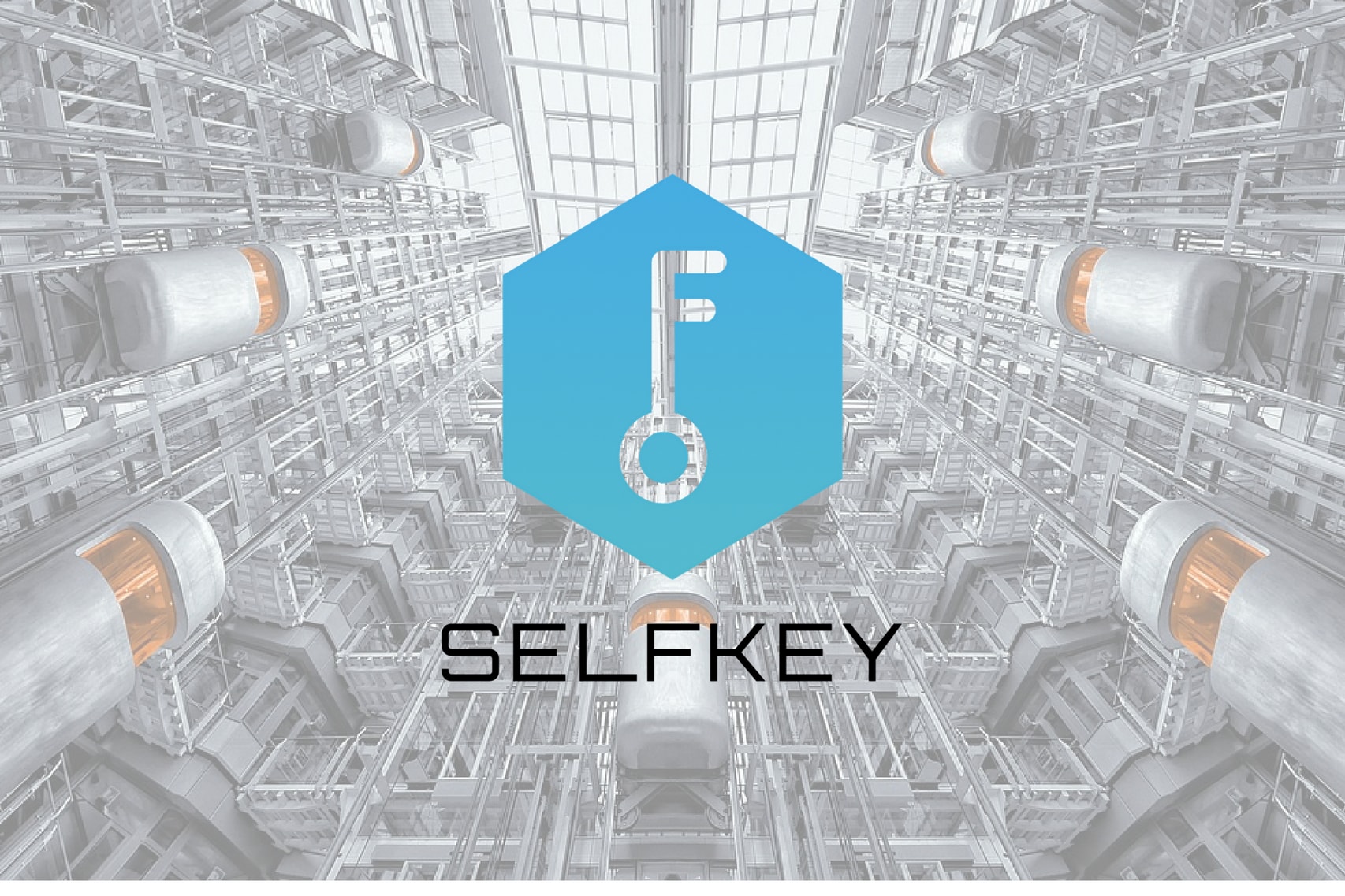If you’ve followed the blockchain space for any length of time, you’ve probably heard quite a bit of talk about digital identities. While progress is being made in almost all technological arenas, the manner in which people control sensitive data and digital assets, i.e. their identity, remains rooted in the past.
People still do paperwork and trust their information to the centralized databases of highly breachable third parties, and over a billion people live in places where current identity systems present an obstacle for accessing things like healthcare, financial services, and education. All of this is not to mention the cost and headache businesses face when following KYC and AML regulations.
The problem is that we don’t own our identities, and this fact is crying out for change.
Enter SelfKey, an all-new blockchain-based identity management platform that makes use of a concept known as self-sovereign identity (SSID). SelfKey provides organizations and individuals with full ownership of their own digital identities, empowering them to discover additional privacy and freedom.
SelfKey raised US$21,780,000 in an ICO earlier this year and has just released a beta version of their flagship wallet product, so we thought now would be a good time to give this project a thorough once over.
In the following, we’ll explain the solution SelfKey is offering, discuss how it works, provide some background on the team, prognosticate about the future, and generally tell you everything you need to know about SelfKey.
The SelfKey Solution
A successful identity system achieves a number of things: security, privacy, ownership, access, and, ideally, interoperability.
SelfKey is setting out to offer all of the above with the implementation of their blockchain-built SSID system. The SSID is a solution that puts users back in control of their data and aims to make identity theft a thing of the past. To take it straight from the white paper:
SelfKey is designed to be censorship-proof, fair, inclusive, agile, and lean through a well-designed open source technology stack, and transparent legal & governance infrastructure.
The crux of this entire scheme is the SelfKey digital wallet, which allows users to retain control and ownership of their identity documents and do things like open bank accounts or apply for visas. The wallet is capable of storing sensitive information like passport numbers, tax identifiers, driver’s license numbers, and account info. Through the magic of public/private key cryptography, users can securely share digital information as they see fit.
Here is what this looks like in practice:


For example, if someone wants to conduct a financial transaction that requires proof of citizenship, the process is seamless. Instead of having to photocopy their passport and physically deliver it to the bank, a SelfKey user will simply go to their digital wallet, sign over a copy (an encrypted version will be sent via SelfKey’s network) using the bank’s public key. The bank uses their private key to access the passport, and to everyone else on the network the contents of this transaction are invisible.
SelfKey also allows users to do things like:
- Participate in multiple token sales easily via the digital wallet.
- Send and receive payments (as well as identity documents) with one click.
- Stake their KEY tokens to access the network as well as to verify and notarize their ID documents.
- Purchase (via KEY tokens) services such as state residencies or licenses.
How the SelfKey System Works
When we refer to SelfKey, this could mean a few different things, as SelfKey consists of more than one entity.
These are:
- The SelfKey Foundation, a not-for-profit foundation whose aim is to preserve the sanctity of the principles upon which SelfKey was built – namely, fundamental freedom and privacy as it relates to personal data.
- SelfKey Technology, which includes their free and open-source identity wallet, a blockchain layer, a native token (KEY), and SON-LD, a machine-readable protocol that connects SelfKey with other third-party microservices.
- The SelfKey Marketplace, a decentralized trading venue for users to make transactions for real products and services (over 300 offerings).
The SelfKey system runs on smart contracts with economic incentives powered by the KEY (an ERC20) token and smart contracts that operate on the Ethereum Blockchain. The 3 pillars of the SelfKey system are its wallet, marketplace, and the KEY token (see below for a thumbnail of how each functions).

The architecture described above streamlines the entire KYC process and allows qualified third-party certifiers and identity owners to process transactions in a highly secure, private, and decentralized manner. The certifiers are capable of providing identity authentication upon request.
This authentication can then be shared multiple times with banks or other service providers. Having these certifications and reusable attestations makes it so that you can apply for various things without having to repeatedly share information, and in this way, the KYC process becomes much more efficient and secure.
Here’s a visual:

With SelfKey, relying parties, certifiers, and identity owners can transact in a secure, private, decentralized manner. Below is a brief description of how the system works for each party:
From an identity owner’s perspective, things are pretty simple. After going through the verification process, you can instantly (and, most importantly, securely) access goods and services without having to go through the arduous KYC processes discussed above. Also, since all of your data is not on a centralized server (but rather stored locally on your device), users can have a higher degree of certainty that no malicious third-party will get access.
SelfKey also minimizes data exposure through the use of its verifiable claims protocol. This protocol lets an identity owner prove something without actually showing the supporting documentation. For example, a user can share a verified claim of citizenship instead of sharing their actual passport.
Lastly, let’s not forget that SelfKey is primarily a digital wallet, and as such it gives you the full range of functionality you’d expect from a cryptocurrency wallet — things like the ability to securely manage digital assets like ETH, KEY, and/or any other ERC-20 token.
The SelfKey Team
Compared to other fledgling blockchain projects, the SelfKey team is quite large, boasting well-populated developer and compliance ranks.
Here are a few of the key faces:
Edmund Lowell is the founder of the SelfKey Foundation and the project’s parent company KYC-chain. An entrepreneur working at the crossroads of finance, technology, and the law, Edmund has been involved with a few other notable personal data protection projects, self-sovereign digital identity systems, and blockchains.

Terry Lin is the head of product and growth efforts at SelfKey. Terry has previous experience in product management, sales, and growth marketing, and has worked with a number of big names including AMZ tracker and UBS.
The development and engineering team at SelfKey has a distinct Georgian theme to it, with numerous members of the technical staff hailing from this small country. Some of these same team members were responsible for helping the Georgian government architect a digital ID system, experience that is currently being leveraged to good effect.
Lastly, SelfKey has quite a few notable advisors and solid partnerships. Its advisors range from IT security experts to academics to investment professionals along with a number of country-specific consultants.
On the partnership front, SelfKey is aligned with Polymath, Lexit Marketplace, and Kyber Network (to name a few).
KEY Token Performance and How To Purchase
KEY was first introduced to the market earlier this year at the modest price of $0.08/per token. It subsequently dropped quite a bit, and it wasn’t until just recently that it really began to climb again. On the back of its recent Binance debut and the release of its wallet, the price of KEY has spiked considerably.

There is currently no direct fiat-to-KEY method of buying in, which means you’ll first have to purchase some BTC or ETH. Once you have purchased a trading pair, you can trade for KEY tokens on the following exchanges:
Final Thoughts
SelfKey is an ambitious stab at solving the identity problems of an increasingly digital, blockchain-influenced world. It benefits identity owners who want to protect themselves, it provides a method for certifiers to make a profit, and it allows companies to streamline previously problematic KYC processes.
SelfKey has many competitors – theKey, Microsoft’s Authenticator app, and, perhaps most notably, Civic. Although when queried about competition in an AMA a few months back, founder Edmund Lowell had this to say:
As a CEO of a blockchain identity startup once said to me: we are both mosquitos at a nudist colony.
Although the wallet is only in beta, there are many promising signs for SelfKey. Incoming regulation to the crypto world and the need for KYC across exchanges, ICOs, etc. could significantly drive demand for what SelfKey offers. These are exciting times, so stay tuned.
If interested, you can download the Identity Wallet here, or you can stay in tune with SelfKey news and announcements by following their blog, Twitter, and Telegram.
Related: The Cambridge Analytica Effect And the Protection of Personal Data


